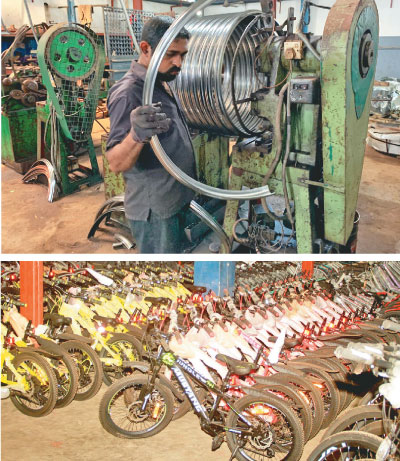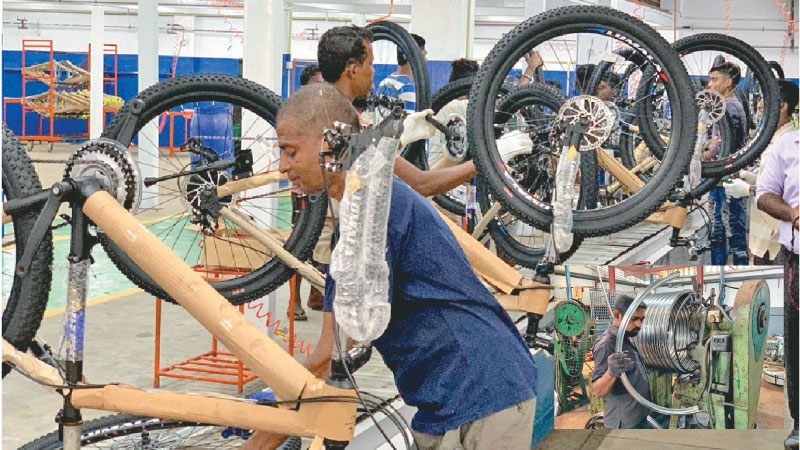Lumala, which means strength in Japanese, is undoubtedly the country’s leading bicycle. In the face of challenges, Lumala has come a long way, crossing all barriers.
Lumala has been the leader in bicycle manufacturing in Sri Lanka for more than 38 years and three generations because of its perseverance in the face of many challenges.

City Cycle Industries Managing Director Asmi Miflal and CEO Tharif Miflal with the Gold award won by the company at the National Industry Excellence Awards 2023
After the closure of the Lumala bicycle factory in Japan, in 1985, M. M. Miflal of City Cycle Industries purchased the brand name and moved the factory to Sri Lanka.
By 2010, it had conquered the foreign market and increased its workforce to 1,500 employees. Production capacity was as high as 2,000 bicycles per day. In 2010, Sri Lanka ranked third in the supply of bicycles to the European Union. Lumala now exports bicycles and e-bicycles to all parts of the world including neighbouring India and Pakistan.
Due to the economic recession in the country and the difficulty in obtaining raw materials and high taxation, the production of bicycles has to incur huge costs.
It is now difficult for City Cycle Company, Lumala’s parent company, which used to produce up to 2,000 bicycles per day, to meet that capacity. This affects all local manufacturers of bicycles and should be brought to the attention of the Government to provide assistance to them.
Export income
This business, which improves the local economy, can also increase its contribution to export income. Asim Miflal, Director of Lumala, says that if the Government intervenes more in this local production, it is possible to increase its production capacity and hence the income levels.
“The Lumala bicycle manufactured by our City Cycle Company is a bicycle made entirely in Sri Lanka. But currently there is a ban on bicycles exported to the European Union. As for the reason for the ban, they say that bicycles exported to foreign markets must be more than fifty percent locally assembled, which is the basic qualification for exporting to the European market. That qualification was not met by Lumala at that time, but we had met that qualification well.
“But in 2013, the European Union audited the raw materials we imported for the domestic market in this value-added regulation, so they imposed a ban on our imports on the basis of added value. After that, the then owner of the ‘Lumala’ filed a case in the European Union. We won the case on the basis that the greater component of value addition was from domestic sources. After that, the European Union filed an appeal and we won in that appeal as well. But we have not been allowed to export to the European Union until now.
“As a country facing an economic recession, we have the ability to contribute to the economic process of this country. During the period when we exported bicycles to the European Union, we were able to earn a large amount of foreign exchange. Therefore, we request the Government to intervene in this matter. If the responsible parties intervene and provide some relief, we have the ability to earn more foreign exchange for the country,” says Miflal.
Lumala produces many models, including electric bicycles that can run for 100 kilometres on one charge at a cost of less than one rupee per kilometre. The Sri Lanka branch of the ride hailing and food delivery giant Uber recently ordered 100 electric bicycles for its riders from Lumala.
Under this technology, ordinary electric bicycles, specially designed double seat electric bicycles for tourists, special electric bicycles that can collect light waste including discarded plastic bottles, electric wheelchairs, electric bicycles with seats for passenger transportation, are manufactured at their state-of-the-art factory.
The electric bicycles (e-bikes) produced by Lumala Company, are produced under the Lycan brand. The use of electric bicycles is a great saving both physically and financially. A daily user will get a fuel saving of around 8,000 rupees per month.
 “Bicycles made in Sri Lanka can compete with bicycles from other countries. This competitiveness can be maintained all over the world. The Government needs to take the initiative and do that. New producers and exporters have emerged from within the country. However, due to the non-issue of dollars to import things like iron and steel, the prices have gone up a lot.”
“Bicycles made in Sri Lanka can compete with bicycles from other countries. This competitiveness can be maintained all over the world. The Government needs to take the initiative and do that. New producers and exporters have emerged from within the country. However, due to the non-issue of dollars to import things like iron and steel, the prices have gone up a lot.”
More incentives
Lumala General Manager Ranjith Siriwardena commended Transport, Highways and Media Minister Dr. Bandula Gunawardena for stepping forward to encourage the local bicycle industry and for intervening to get more incentives for them.
The Lumala management echoing the sentiments of the local bicycle manufacturing industry says the Government should take the lead to protect the industry.
Regulations and standards should be mandatory for the import of bicycles to protect the local bicycle manufacturing industry. Taxes should be rationalised so that the local bicycle industry is not adversely affected. Any barriers for earning foreign exchange should be removed.
Translated by Jonathan Frank









